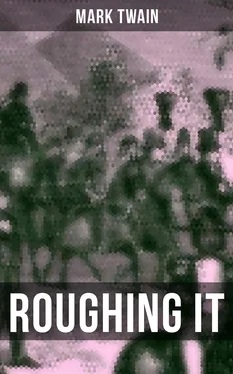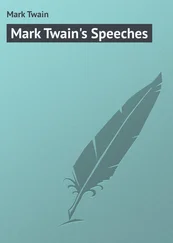The station buildings were long, low huts, made of sundried, mud-colored bricks, laid up without mortar (adobes, the Spaniards call these bricks, and Americans shorten it to ‘dobies). The roofs, which had no slant to them worth speaking of, were thatched and then sodded or covered with a thick layer of earth, and from this sprung a pretty rank growth of weeds and grass. It was the first time we had ever seen a man’s front yard on top of his house. The building consisted of barns, stable-room for twelve or fifteen horses, and a hut for an eating-room for passengers. This latter had bunks in it for the station-keeper and a hostler or two. You could rest your elbow on its eaves, and you had to bend in order to get in at the door. In place of a window there was a square hole about large enough for a man to crawl through, but this had no glass in it. There was no flooring, but the ground was packed hard. There was no stove, but the fireplace served all needful purposes. There were no shelves, no cupboards, no closets. In a corner stood an open sack of flour, and nestling against its base were a couple of black and venerable tin coffee-pots, a tin teapot, a little bag of salt, and a side of bacon.
By the door of the station-keeper’s den, outside, was a tin wash-basin, on the ground. Near it was a pail of water and a piece of yellow bar soap, and from the eaves hung a hoary blue woolen shirt, significantly — but this latter was the station-keeper’s private towel, and only two persons in all the party might venture to use it — the stage-driver and the conductor. The latter would not, from a sense of decency; the former would not, because did not choose to encourage the advances of a station-keeper. We had towels — in the valise; they might as well have been in Sodom and Gomorrah. We (and the conductor) used our handkerchiefs, and the driver his pantaloons and sleeves. By the door, inside, was fastened a small old-fashioned looking-glass frame, with two little fragments of the original mirror lodged down in one corner of it. This arrangement afforded a pleasant double-barreled portrait of you when you looked into it, with one half of your head set up a couple of inches above the other half. From the glass frame hung the half of a comb by a string — but if I had to describe that patriarch or die, I believe I would order some sample coffins.
It had come down from Esau and Samson, and had been accumulating hair ever since — along with certain impurities. In one corner of the room stood three or four rifles and muskets, together with horns and pouches of ammunition. The station-men wore pantaloons of coarse, country-woven stuff, and into the seat and the inside of the legs were sewed ample additions of buckskin, to do duty in place of leggings, when the man rode horseback — so the pants were half dull blue and half yellow, and unspeakably picturesque. The pants were stuffed into the tops of high boots, the heels whereof were armed with great Spanish spurs, whose little iron clogs and chains jingled with every step. The man wore a huge beard and mustachios, an old slouch hat, a blue woolen shirt, no suspenders, no vest, no coat — in a leathern sheath in his belt, a great long “navy” revolver (slung on right side, hammer to the front), and projecting from his boot a horn-handled bowie-knife.
The furniture of the hut was neither gorgeous nor much in the way. The rocking-chairs and sofas were not present, and never had been, but they were represented by two three-legged stools, a pine-board bench four feet long, and two empty candle-boxes. The table was a greasy board on stilts, and the tablecloth and napkins had not come — and they were not looking for them, either. A battered tin platter, a knife and fork, and a tin pint cup, were at each man’s place, and the driver had a queensware saucer that had seen better days. Of course this duke sat at the head of the table. There was one isolated piece of table furniture that bore about it a touching air of grandeur in misfortune. This was the caster. It was German silver, and crippled and rusty, but it was so preposterously out of place there that it was suggestive of a tattered exiled king among barbarians, and the majesty of its native position compelled respect even in its degradation.
There was only one cruet left, and that was a stopperless, fly-specked, broken-necked thing, with two inches of vinegar in it, and a dozen preserved flies with their heels up and looking sorry they had invested there.
The station-keeper upended a disk of last week’s bread, of the shape and size of an old-time cheese, and carved some slabs from it which were as good as Nicholson pavement, and tenderer.
He sliced off a piece of bacon for each man, but only the experienced old hands made out to eat it, for it was condemned army bacon which the United States would not feed to its soldiers in the forts, and the stage company had bought it cheap for the sustenance of their passengers and employees. We may have found this condemned army bacon further out on the plains than the section I am locating it in, but we found it — there is no gainsaying that.
Then he poured for us a beverage which he called “Slum gullion,” and it is hard to think he was not inspired when he named it. It really pretended to be tea, but there was too much dishrag, and sand, and old bacon-rind in it to deceive the intelligent traveler.
He had no sugar and no milk — not even a spoon to stir the ingredients with.
We could not eat the bread or the meat, nor drink the “slumgullion.” And when I looked at that melancholy vinegar-cruet, I thought of the anecdote (a very, very old one, even at that day) of the traveler who sat down to a table which had nothing on it but a mackerel and a pot of mustard. He asked the landlord if this was all. The landlord said:
“All! Why, thunder and lightning, I should think there was mackerel enough there for six.”
“But I don’t like mackerel.”
“Oh — then help yourself to the mustard.”
In other days I had considered it a good, a very good, anecdote, but there was a dismal plausibility about it, here, that took all the humor out of it.
Our breakfast was before us, but our teeth were idle.
I tasted and smelt, and said I would take coffee, I believed. The station-boss stopped dead still, and glared at me speechless. At last, when he came to, he turned away and said, as one who communes with himself upon a matter too vast to grasp:
“Coffee! Well, if that don’t go clean ahead of me, I’m d — -d!”
We could not eat, and there was no conversation among the hostlers and herdsmen — we all sat at the same board. At least there was no conversation further than a single hurried request, now and then, from one employee to another. It was always in the same form, and always gruffly friendly. Its western freshness and novelty startled me, at first, and interested me; but it presently grew monotonous, and lost its charm. It was:
“Pass the bread, you son of a skunk!” No, I forget — skunk was not the word; it seems to me it was still stronger than that; I know it was, in fact, but it is gone from my memory, apparently. However, it is no matter — probably it was too strong for print, anyway. It is the landmark in my memory which tells me where I first encountered the vigorous new vernacular of the occidental plains and mountains.
We gave up the breakfast, and paid our dollar apiece and went back to our mail-bag bed in the coach, and found comfort in our pipes. Right here we suffered the first diminution of our princely state. We left our six fine horses and took six mules in their place. But they were wild Mexican fellows, and a man had to stand at the head of each of them and hold him fast while the driver gloved and got himself ready. And when at last he grasped the reins and gave the word, the men sprung suddenly away from the mules’ heads and the coach shot from the station as if it had issued from a cannon. How the frantic animals did scamper! It was a fierce and furious gallop — and the gait never altered for a moment till we reeled off ten or twelve miles and swept up to the next collection of little station-huts and stables.
Читать дальше












